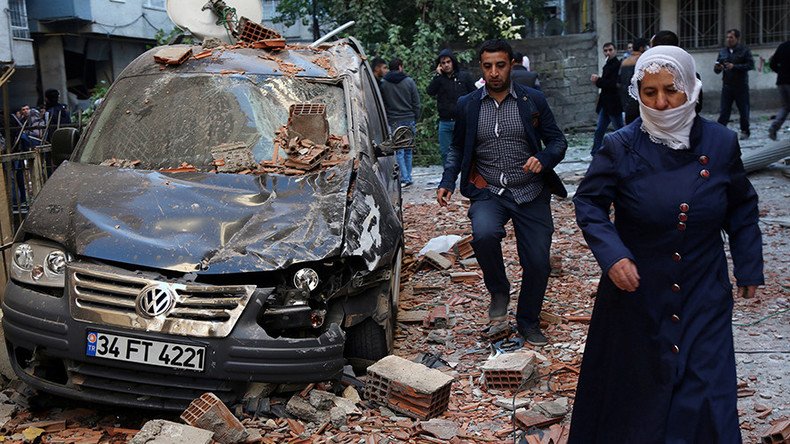ISIS claims responsibility for Diyarbakir bombing as Turkish govt blames Kurds

Islamic State (IS, formerly ISIS, ISIL) has claimed responsibility for a car bomb blast in the southeastern Turkish city of Diyarbakir that killed at least 9 people and injured over 100, Reuters reports. It comes after Ankara attributed the attack to Kurdish militant group PKK.
The agency cited the terrorist group’s Amaq news agency claiming IS carried out the Friday morning attack, which targeted a riot police building in one of the largest cities in southeast Turkey.
The blast went off close to the Diyarbakir state prison, where some of the opposition leaders, arrested late last night by Turkish police, are believed to be held.
Two co-chairs and 11 deputies of pro-Kurdish Peoples’ Democratic Party (HDP) were detained for their refusal to give testimony on the probes linked to “terrorist propaganda.” Three of the deputies were subsequently released “under judicial control” after the first day of proceedings on Saturday, the state-run Anadolu news agency reports. The deputies are not allowed to leave the country for the time of the investigation.
READ MORE: Turkey cracks down on social media – not for the first time
In the aftermath of the explosion, the Diyarbakir governor issued a statement, claiming that the military wing of the Kurdistan Workers’ Party (PKK) was behind the attack. Turkish Prime Minister Binali Yildirim also attributed the attack to the PKK, saying that one of the deceased was a suspected member of the outlawed group. Ankara has accused HDP of having links to the PKK.
The EU has condemned the bombing, laying the blame on the PKK, with EU foreign policy chief Federica Mogherini issuing a statement in which she reiterated that “the EU considers the PKK to be a terrorist organization,” while expressing condolences to the victims.
Washington has echoed the statement, urging the PKK “to cease its senseless, brutal attacks,” with US State Department spokesman John Kirby calling the blast an “indefensible bombing.”
At the same time, he also accused the Turkish government of “undermining confidence in Turkey’s democracy and economic prosperity,” with its policy of Internet shutdowns. Earlier, Kirby also said that the Washington is “deeply concerned” with the Turkish government’s crackdown on the opposition.
The Turkish media has temporarily been barred from covering the attack in Diyarbakir. In the immediate aftermath of the arrests, it also restricted access to Twitter, Facebook and social messaging app WhatsApp.
The spate of arrests has drawn sharp criticism from EU leaders, with the President of the European Parliament, Martin Schulz, saying that by detaining opposition deputies, who he said were “legitimate and democratic representatives of Turkish society,” Turkey “sends a chilling signal about the state of political pluralism.”
READ MORE: ‘You’re aiding terror!’ Erdogan slams Germany after Merkel’s critical comments
Apart from “pushing Turkey further away from democracy,” its leaders are “turning their backs on the values, principles, norms and rules underpinning EU-Turkey relations” he said.
The ambassadors of EU member states in Turkey convened for an urgent meeting to discuss the union’s strategy in the light of the worsening relations between Turkey and the block, Hurriyet Daily News reported. At the meeting, which was reportedly attended by Mogherini via a video call, the diplomats voiced “deep concern” over the political course pursued by the Turkish government. According to one of the ambassadors, who spoke to Hurriyet, the EU has been preparing “critical” report on Turkey which “will not be welcomed with open arms by the Turkish government.”
“If the death penalty is reintroduced, this will be a deterioration of democracy,” the unnamed ambassador said, adding that the political setback in the EU-Turkey relations “bad for the Union, but it’s even worse for Turkey.”
Turkish President Recep Tayyip Erdogan recently indicated that he is ready to deliver on his pledge to reintroduce the death penalty, which he made in the aftermath of the July 15 thwarted coup attempt, sparking outrage among Turkey’s European partners.












